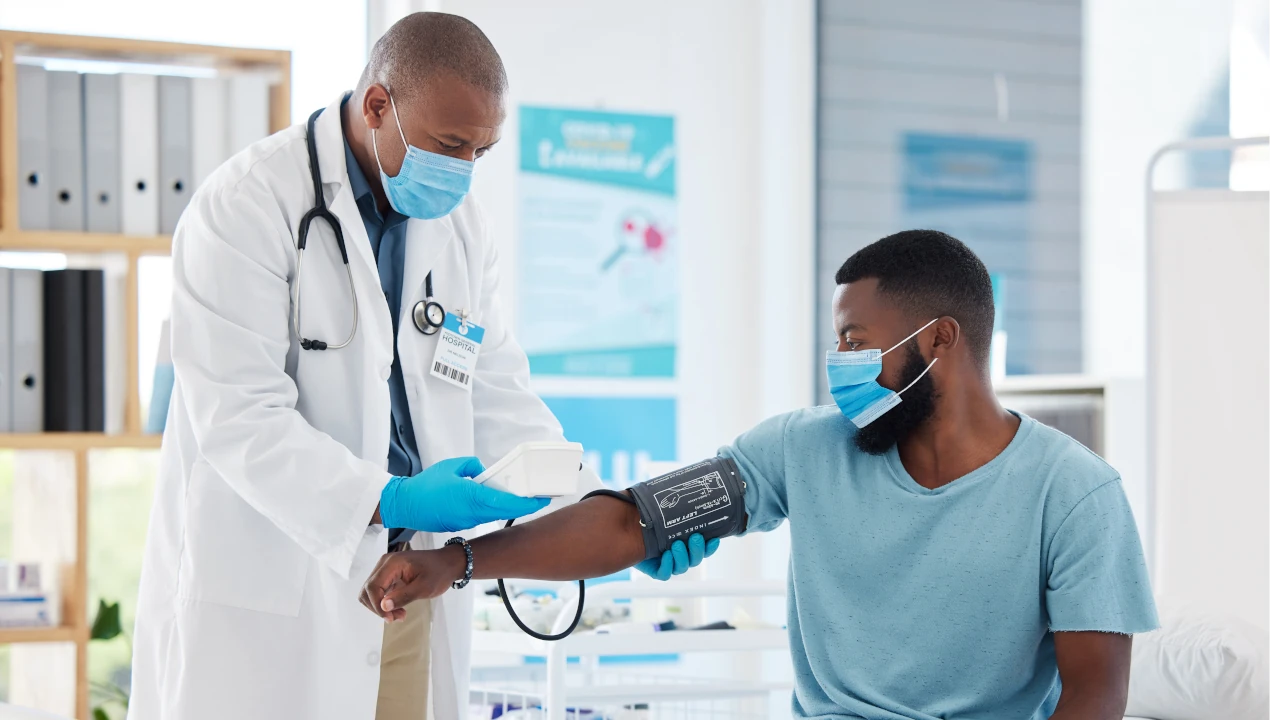Hypertension, often referred to as high blood pressure, stands as a pervasive health concern afflicting millions across the globe. While conventional pharmacological interventions remain a cornerstone of treatment, there’s a burgeoning curiosity surrounding non-pharmacological approaches to tackle hypertension with efficacy.
In this comprehensive guide, we embark on a journey through an array of non-pharmacological treatments meticulously curated to aid individuals in nurturing optimal blood pressure levels and fostering a life of vitality and fulfillment, including the integration of remote patient monitoring (RPM) to enhance hypertension management strategies.
Dietary Modifications
Diet plays a crucial role in managing hypertension. Incorporating a balanced diet rich in fruits, vegetables, whole grains, and lean proteins can significantly impact blood pressure levels. The Dietary Approaches to Stop Hypertension (DASH) diet, which emphasizes fruits, vegetables, and low-fat dairy products, has shown promising results in lowering blood pressure. Limiting sodium intake and avoiding processed foods high in salt is also essential for hypertensive individuals.
Physical Activity
Regular exercise is paramount for overall health and well-being, including blood pressure management. Engaging in aerobic exercises such as brisk walking, cycling, or swimming for at least 30 minutes most days of the week can help lower blood pressure. Strength training exercises targeting major muscle groups can also contribute to better blood pressure control.
Stress Management Techniques
Chronic stress can contribute to hypertension by elevating blood pressure levels. Implementing stress management techniques such as meditation, deep breathing exercises, yoga, or tai chi can help individuals cope with stress more effectively. Prioritizing relaxation and incorporating mindfulness practices into daily routines can have a positive impact on blood pressure.
Weight Management
Maintaining a healthy weight is crucial for managing hypertension. Obesity is a significant risk factor for high blood pressure, so achieving and maintaining a healthy weight through a combination of diet and exercise is essential. Even modest weight loss can lead to significant improvements in blood pressure levels and overall cardiovascular health.
Limiting Alcohol Consumption
Excessive alcohol consumption can contribute to hypertension and other health problems. Limiting alcohol intake to moderate levels, defined as up to one drink per day for women and up to two drinks per day for men, can help prevent high blood pressure and its associated complications.
Smoking Cessation
Smoking is a major risk factor for cardiovascular disease, including hypertension. Quitting smoking can lead to significant improvements in blood pressure and overall cardiovascular health. Various smoking cessation strategies, such as nicotine replacement therapy, counseling, or support groups, can help individuals kick the habit for good.
Herbal Remedies and Supplements
Some individuals may explore herbal remedies and supplements as adjuncts to traditional hypertension treatments. While certain herbs and supplements, such as garlic, fish oil, or coenzyme Q10, have shown potential in lowering blood pressure, it’s essential to consult with a healthcare professional before incorporating them into a treatment regimen. Some supplements may interact with medications or have adverse effects on health.
Regular Monitoring and Follow-Up
Regardless of the chosen treatment approach, regular monitoring of blood pressure levels is essential for effective management of hypertension. Individuals with hypertension should monitor their blood pressure regularly at home using a reliable blood pressure monitor and keep track of readings over time. Regular follow-up appointments with healthcare providers are also crucial to assess treatment efficacy, adjust medications if necessary, and address any concerns or complications.
Importance of Sleep Quality
Quality sleep is crucial for overall health and well-being, including blood pressure management. Poor sleep habits, such as inadequate sleep duration or disrupted sleep patterns, can contribute to hypertension and other cardiovascular complications. Discussing strategies to improve sleep quality, such as maintaining a consistent sleep schedule, creating a relaxing bedtime routine, and optimizing sleep environment, can provide valuable insights for individuals looking to manage their blood pressure effectively.
Role of Social Support Networks
Social support networks play a significant role in managing hypertension and promoting overall health. Strong social connections and a supportive environment can help individuals cope with stress, adhere to lifestyle modifications, and stay motivated on their hypertension management journey. Exploring the importance of building and nurturing social relationships, seeking support from friends, family, or support groups, and fostering a sense of community can empower individuals to take control of their health and well-being.
- Emotional support: Friends, family members, or support groups can offer emotional support during times of stress or uncertainty related to hypertension. Having someone to talk to and share experiences with can alleviate feelings of isolation and anxiety.
- Practical assistance: Social networks can provide practical assistance in implementing lifestyle modifications recommended for managing hypertension. Whether it’s preparing healthy meals together, exercising as a group, or helping with daily tasks, having support from others can make it easier to adopt and maintain healthy habits.
- Motivation and accountability: Being part of a supportive community can help individuals stay motivated and accountable for their hypertension management efforts. Peer encouragement, shared goals, and regular check-ins can inspire individuals to stay on track with their treatment plan and make positive changes to their lifestyle.
- Information and resources: Social support networks can serve as valuable sources of information and resources related to hypertension management. Sharing knowledge, experiences, and access to relevant resources can empower individuals to make informed decisions about their health and treatment options.
- Reduced stress levels: Interacting with supportive individuals and engaging in social activities can help reduce stress levels, which is beneficial for managing hypertension. Stress management is an integral part of hypertension treatment, and having a strong support system can provide effective coping mechanisms for dealing with stressors.
- Enhanced quality of life: Overall, strong social connections and a supportive environment contribute to a higher quality of life for individuals living with hypertension. Feeling connected, valued, and supported by others can improve mental well-being, increase resilience, and enhance overall health outcomes.
Frequently Asked Questions
Can non-pharmacological treatments alone effectively manage hypertension?
Yes, non-pharmacological treatments such as dietary modifications, regular exercise, stress management techniques, and weight management can play a significant role in managing hypertension. However, individual responses may vary, and some individuals may require a combination of non-pharmacological and pharmacological treatments for optimal blood pressure control.
Are there specific foods that can help lower blood pressure?
Yes, certain foods, such as fruits, vegetables, whole grains, and lean proteins, can help lower blood pressure levels. The DASH diet, which emphasizes these food groups while limiting sodium intake, has been shown to be particularly effective in lowering blood pressure.
How important is physical activity in managing hypertension?
Regular physical activity is essential for managing hypertension as it helps improve cardiovascular health, lower blood pressure, and maintain a healthy weight. Engaging in aerobic exercises like brisk walking, cycling, or swimming for at least 30 minutes most days of the week can significantly contribute to blood pressure control.
Can stress management techniques really lower blood pressure?
Yes, stress management techniques such as meditation, deep breathing exercises, yoga, and tai chi have been shown to lower blood pressure by reducing stress levels and promoting relaxation. Incorporating these techniques into daily routines can help individuals cope with stress more effectively and improve overall cardiovascular health.
Is it necessary to quit smoking to manage hypertension effectively?
Yes, quitting smoking is crucial for managing hypertension and reducing the risk of cardiovascular complications. Smoking is a major risk factor for high blood pressure and cardiovascular disease, so quitting smoking can lead to significant improvements in blood pressure levels and overall health.
Are there any herbal remedies or supplements that can help lower blood pressure?
Some herbal remedies and supplements, such as garlic, fish oil, or coenzyme Q10, have shown potential in lowering blood pressure. However, it’s essential to consult with a healthcare professional before incorporating them into a treatment regimen, as they may interact with medications or have adverse effects on health.
Integrating DrKumo RPM Solution with Hypertension Non-Pharmacological Treatment
DrKumo RPM solution offers a cutting-edge RPM platform that seamlessly integrates with non-pharmacological treatments for hypertension. By leveraging DrKumo’s innovative technology, healthcare providers can remotely monitor patients’ vital signs, including blood pressure, and track their progress in real-time. This integration allows for personalized care plans tailored to each patient’s needs, ensuring adherence to lifestyle modifications and optimizing treatment outcomes. With DrKumo RPM solution, healthcare professionals can empower patients to take control of their hypertension management journey while receiving continuous support and guidance from their care team.
Takeaways
Non-pharmacological treatments play a significant role in managing hypertension and reducing the risk of cardiovascular complications. By adopting healthy lifestyle modifications such as dietary changes, regular exercise, stress management techniques, weight management, limiting alcohol consumption, quitting smoking, and, when appropriate, incorporating herbal remedies and supplements, individuals can effectively lower their blood pressure and improve their overall health and well-being.
Don’t wait until it’s too late – take action now to improve your overall health and well-being. Contact us now!
Disclaimer: The content provided in this guide on non-pharmacological treatments for hypertension is for informational purposes only and should not be considered medical advice. Always consult with a healthcare professional before making any changes to your treatment plan or lifestyle.








